Unilever's Approach to Developing Individuals, Teams, & Orgs
VerifiedAdded on 2023/06/13
|19
|5093
|382
Report
AI Summary
This report provides an analysis of individual, team, and organizational development within Unilever, a British consumer goods production company. It begins by outlining the skills and attributes required by HR professionals, including HR managers, HR assistants, and recruitment coordinators, and presents a SWOT analysis to identify personal strengths and weaknesses. A professional development plan is then created, focusing on improving digital and leadership skills through specific actions and resources. The report also discusses factors to consider when implementing and evaluating inclusive learning, emphasizing accessibility, shared experience, transparency, and communication. Furthermore, it differentiates between organizational and individual learning and analyzes the need for continuous professional development to drive sustainable professional growth. Finally, the report examines learning cycle theories, such as the Honey and Mumford learning styles, to critically analyze the importance of implementing continuous professional development. Desklib offers similar solved assignments and past papers for students.
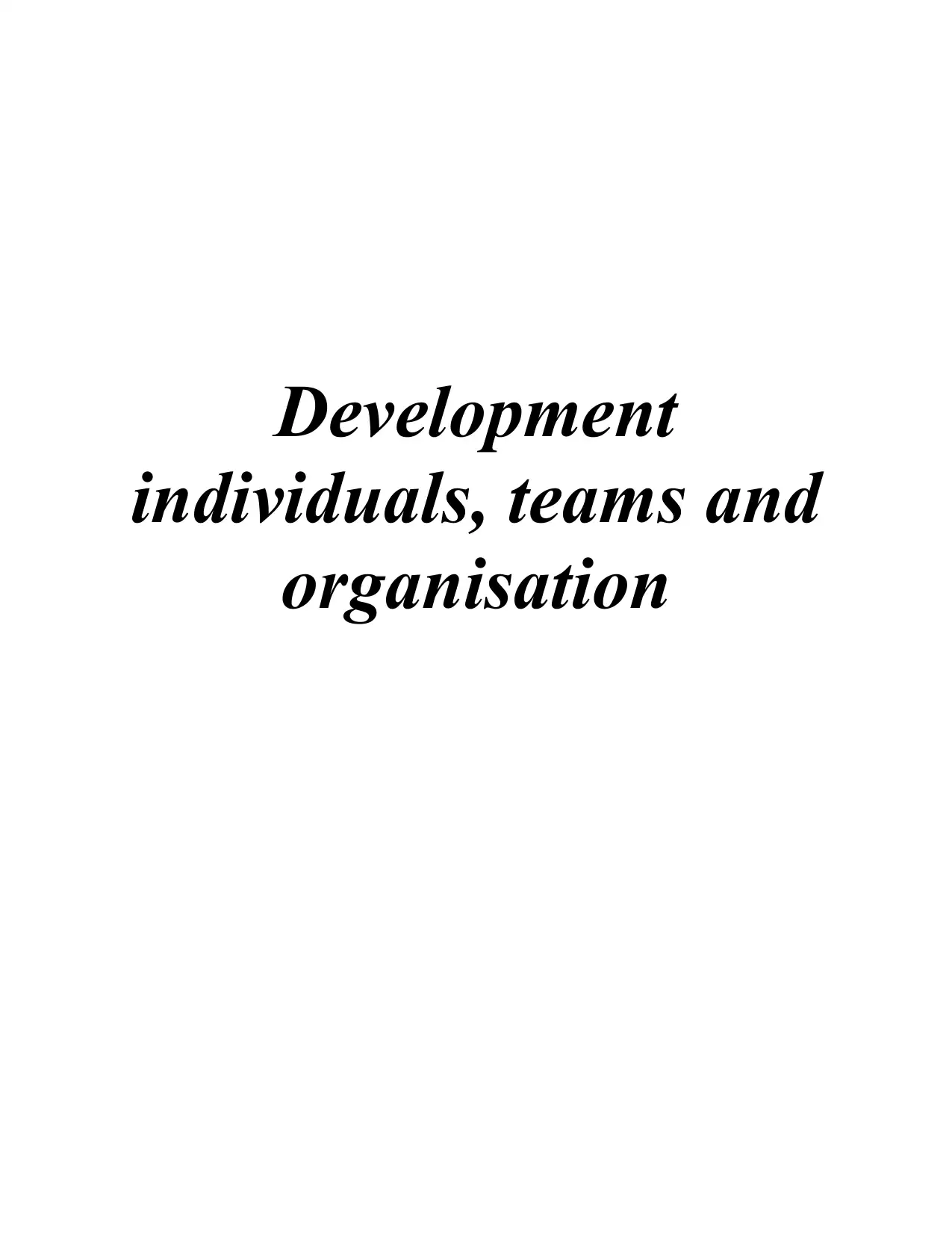
Development
individuals, teams and
organisation
individuals, teams and
organisation
Paraphrase This Document
Need a fresh take? Get an instant paraphrase of this document with our AI Paraphraser

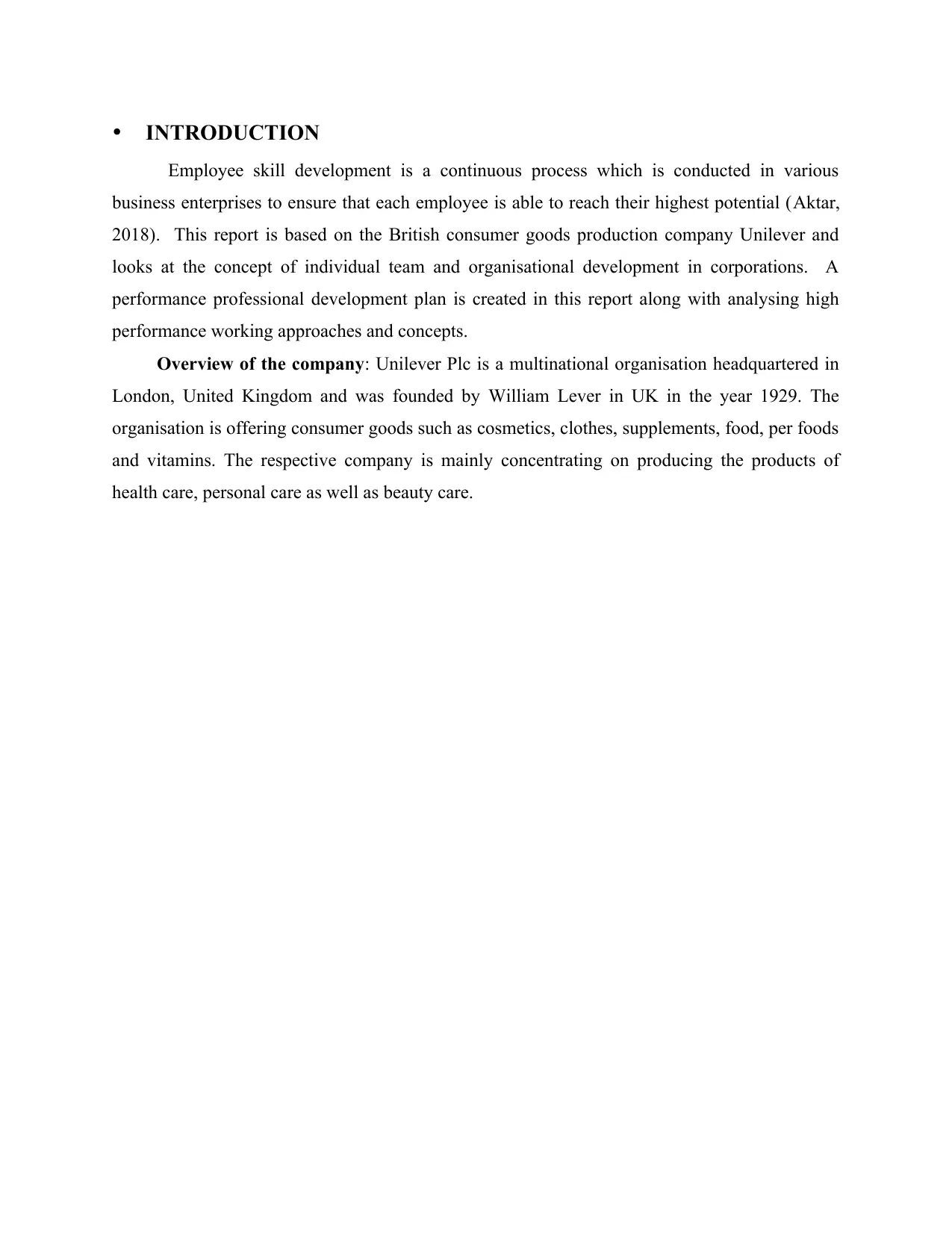
INTRODUCTION
Employee skill development is a continuous process which is conducted in various
business enterprises to ensure that each employee is able to reach their highest potential (Aktar,
2018). This report is based on the British consumer goods production company Unilever and
looks at the concept of individual team and organisational development in corporations. A
performance professional development plan is created in this report along with analysing high
performance working approaches and concepts.
Overview of the company: Unilever Plc is a multinational organisation headquartered in
London, United Kingdom and was founded by William Lever in UK in the year 1929. The
organisation is offering consumer goods such as cosmetics, clothes, supplements, food, per foods
and vitamins. The respective company is mainly concentrating on producing the products of
health care, personal care as well as beauty care.
Employee skill development is a continuous process which is conducted in various
business enterprises to ensure that each employee is able to reach their highest potential (Aktar,
2018). This report is based on the British consumer goods production company Unilever and
looks at the concept of individual team and organisational development in corporations. A
performance professional development plan is created in this report along with analysing high
performance working approaches and concepts.
Overview of the company: Unilever Plc is a multinational organisation headquartered in
London, United Kingdom and was founded by William Lever in UK in the year 1929. The
organisation is offering consumer goods such as cosmetics, clothes, supplements, food, per foods
and vitamins. The respective company is mainly concentrating on producing the products of
health care, personal care as well as beauty care.
⊘ This is a preview!⊘
Do you want full access?
Subscribe today to unlock all pages.

Trusted by 1+ million students worldwide
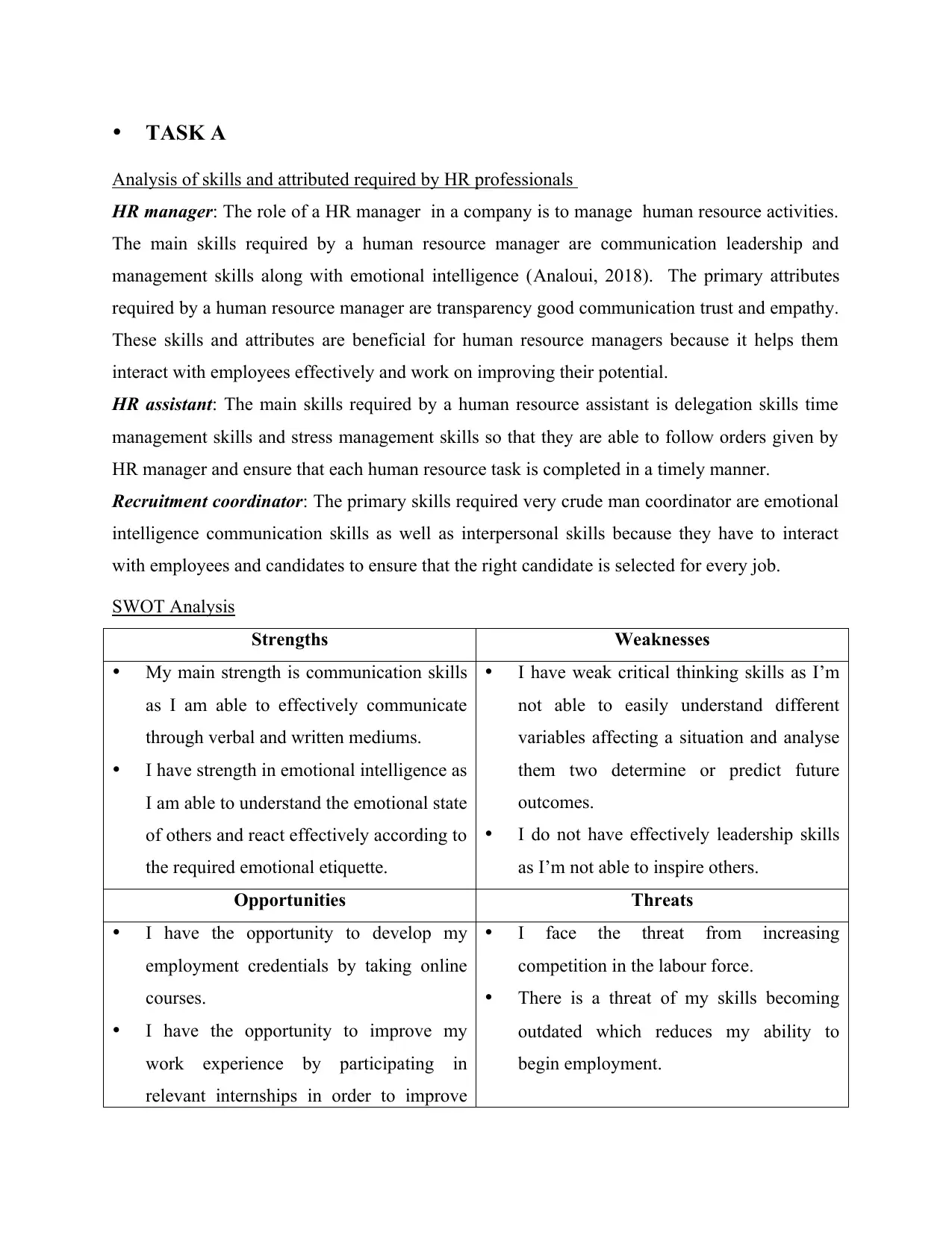
TASK A
Analysis of skills and attributed required by HR professionals
HR manager: The role of a HR manager in a company is to manage human resource activities.
The main skills required by a human resource manager are communication leadership and
management skills along with emotional intelligence (Analoui, 2018). The primary attributes
required by a human resource manager are transparency good communication trust and empathy.
These skills and attributes are beneficial for human resource managers because it helps them
interact with employees effectively and work on improving their potential.
HR assistant: The main skills required by a human resource assistant is delegation skills time
management skills and stress management skills so that they are able to follow orders given by
HR manager and ensure that each human resource task is completed in a timely manner.
Recruitment coordinator: The primary skills required very crude man coordinator are emotional
intelligence communication skills as well as interpersonal skills because they have to interact
with employees and candidates to ensure that the right candidate is selected for every job.
SWOT Analysis
Strengths Weaknesses
My main strength is communication skills
as I am able to effectively communicate
through verbal and written mediums.
I have strength in emotional intelligence as
I am able to understand the emotional state
of others and react effectively according to
the required emotional etiquette.
I have weak critical thinking skills as I’m
not able to easily understand different
variables affecting a situation and analyse
them two determine or predict future
outcomes.
I do not have effectively leadership skills
as I’m not able to inspire others.
Opportunities Threats
I have the opportunity to develop my
employment credentials by taking online
courses.
I have the opportunity to improve my
work experience by participating in
relevant internships in order to improve
I face the threat from increasing
competition in the labour force.
There is a threat of my skills becoming
outdated which reduces my ability to
begin employment.
Analysis of skills and attributed required by HR professionals
HR manager: The role of a HR manager in a company is to manage human resource activities.
The main skills required by a human resource manager are communication leadership and
management skills along with emotional intelligence (Analoui, 2018). The primary attributes
required by a human resource manager are transparency good communication trust and empathy.
These skills and attributes are beneficial for human resource managers because it helps them
interact with employees effectively and work on improving their potential.
HR assistant: The main skills required by a human resource assistant is delegation skills time
management skills and stress management skills so that they are able to follow orders given by
HR manager and ensure that each human resource task is completed in a timely manner.
Recruitment coordinator: The primary skills required very crude man coordinator are emotional
intelligence communication skills as well as interpersonal skills because they have to interact
with employees and candidates to ensure that the right candidate is selected for every job.
SWOT Analysis
Strengths Weaknesses
My main strength is communication skills
as I am able to effectively communicate
through verbal and written mediums.
I have strength in emotional intelligence as
I am able to understand the emotional state
of others and react effectively according to
the required emotional etiquette.
I have weak critical thinking skills as I’m
not able to easily understand different
variables affecting a situation and analyse
them two determine or predict future
outcomes.
I do not have effectively leadership skills
as I’m not able to inspire others.
Opportunities Threats
I have the opportunity to develop my
employment credentials by taking online
courses.
I have the opportunity to improve my
work experience by participating in
relevant internships in order to improve
I face the threat from increasing
competition in the labour force.
There is a threat of my skills becoming
outdated which reduces my ability to
begin employment.
Paraphrase This Document
Need a fresh take? Get an instant paraphrase of this document with our AI Paraphraser
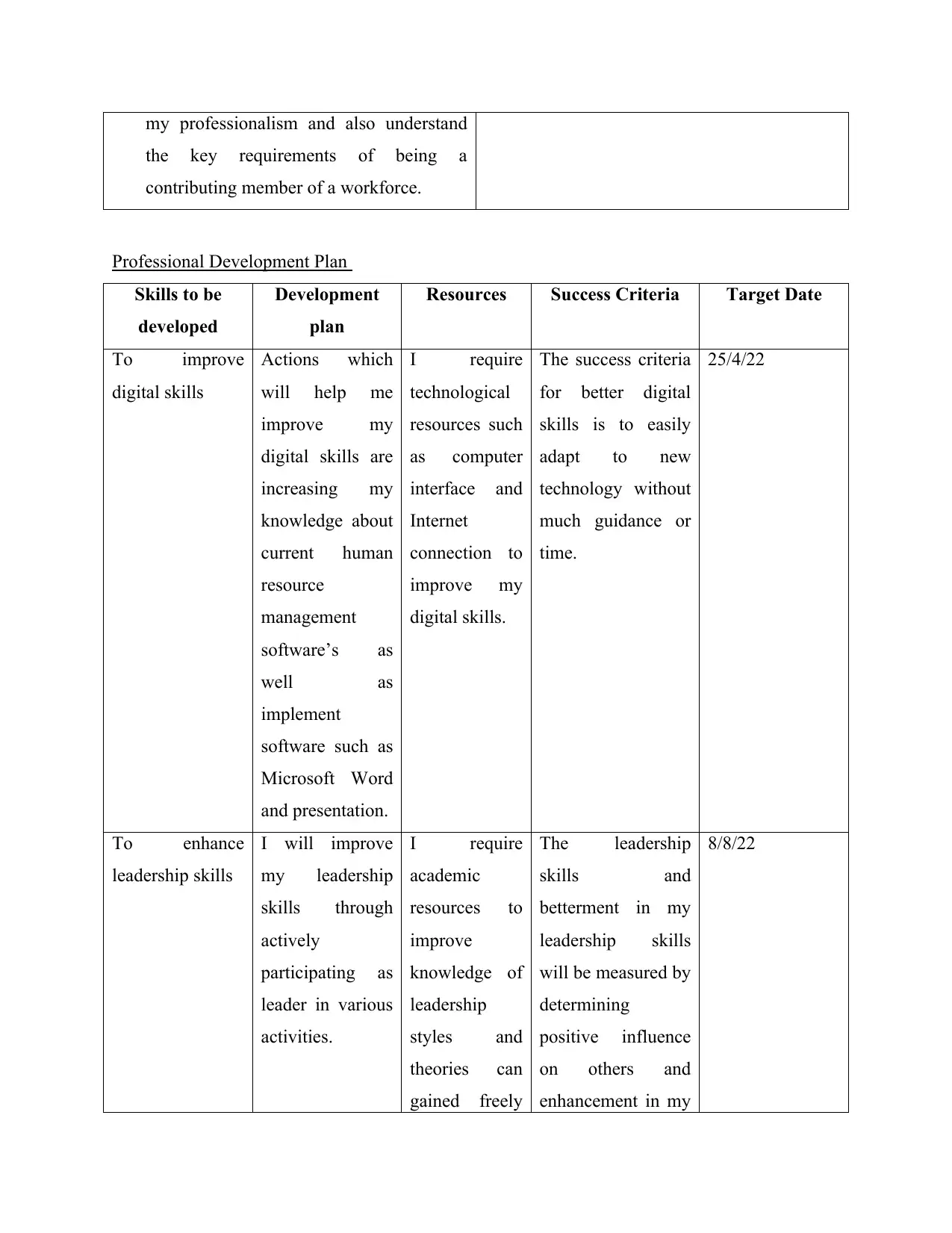
my professionalism and also understand
the key requirements of being a
contributing member of a workforce.
Professional Development Plan
Skills to be
developed
Development
plan
Resources Success Criteria Target Date
To improve
digital skills
Actions which
will help me
improve my
digital skills are
increasing my
knowledge about
current human
resource
management
software’s as
well as
implement
software such as
Microsoft Word
and presentation.
I require
technological
resources such
as computer
interface and
Internet
connection to
improve my
digital skills.
The success criteria
for better digital
skills is to easily
adapt to new
technology without
much guidance or
time.
25/4/22
To enhance
leadership skills
I will improve
my leadership
skills through
actively
participating as
leader in various
activities.
I require
academic
resources to
improve
knowledge of
leadership
styles and
theories can
gained freely
The leadership
skills and
betterment in my
leadership skills
will be measured by
determining
positive influence
on others and
enhancement in my
8/8/22
the key requirements of being a
contributing member of a workforce.
Professional Development Plan
Skills to be
developed
Development
plan
Resources Success Criteria Target Date
To improve
digital skills
Actions which
will help me
improve my
digital skills are
increasing my
knowledge about
current human
resource
management
software’s as
well as
implement
software such as
Microsoft Word
and presentation.
I require
technological
resources such
as computer
interface and
Internet
connection to
improve my
digital skills.
The success criteria
for better digital
skills is to easily
adapt to new
technology without
much guidance or
time.
25/4/22
To enhance
leadership skills
I will improve
my leadership
skills through
actively
participating as
leader in various
activities.
I require
academic
resources to
improve
knowledge of
leadership
styles and
theories can
gained freely
The leadership
skills and
betterment in my
leadership skills
will be measured by
determining
positive influence
on others and
enhancement in my
8/8/22
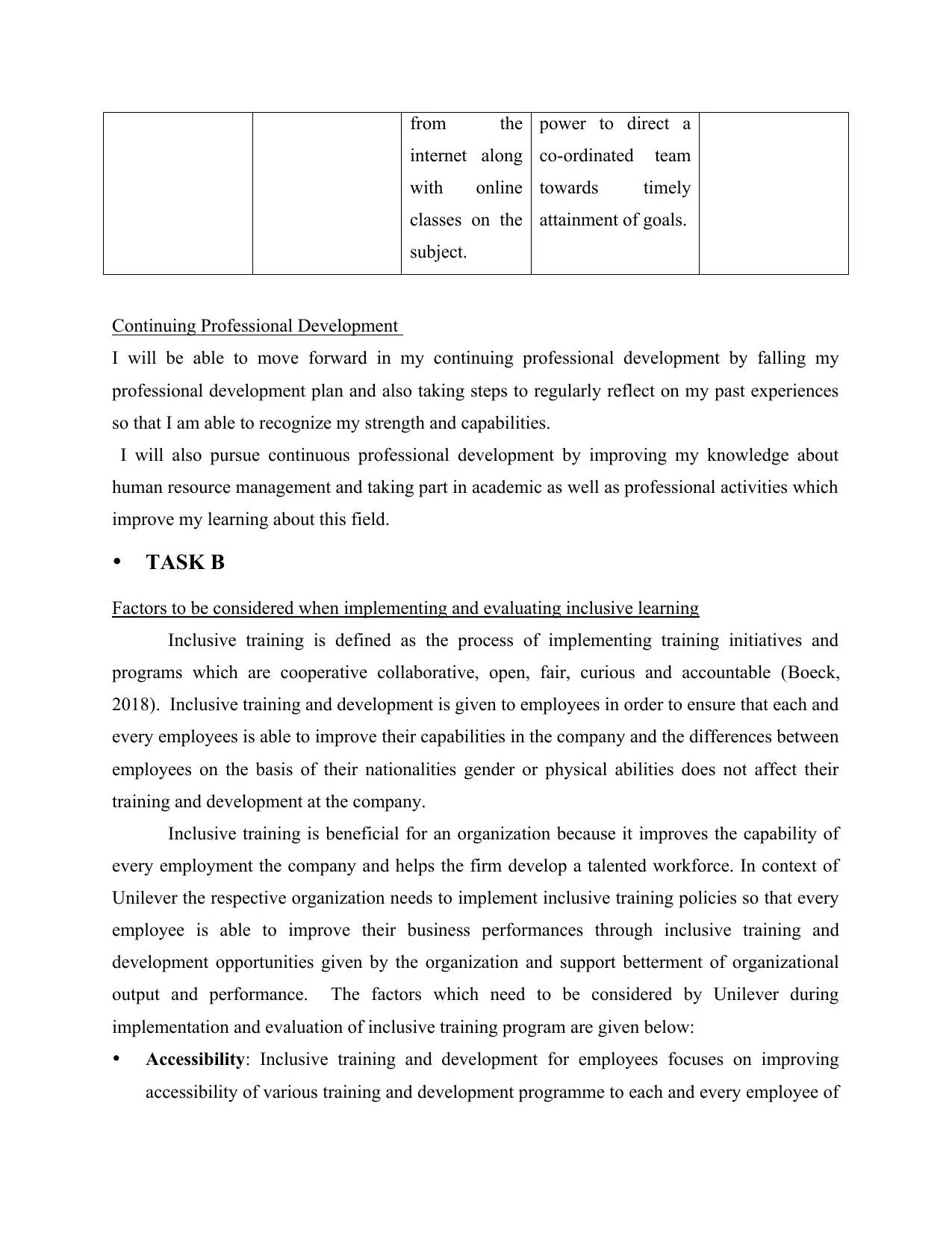
from the
internet along
with online
classes on the
subject.
power to direct a
co-ordinated team
towards timely
attainment of goals.
Continuing Professional Development
I will be able to move forward in my continuing professional development by falling my
professional development plan and also taking steps to regularly reflect on my past experiences
so that I am able to recognize my strength and capabilities.
I will also pursue continuous professional development by improving my knowledge about
human resource management and taking part in academic as well as professional activities which
improve my learning about this field.
TASK B
Factors to be considered when implementing and evaluating inclusive learning
Inclusive training is defined as the process of implementing training initiatives and
programs which are cooperative collaborative, open, fair, curious and accountable (Boeck,
2018). Inclusive training and development is given to employees in order to ensure that each and
every employees is able to improve their capabilities in the company and the differences between
employees on the basis of their nationalities gender or physical abilities does not affect their
training and development at the company.
Inclusive training is beneficial for an organization because it improves the capability of
every employment the company and helps the firm develop a talented workforce. In context of
Unilever the respective organization needs to implement inclusive training policies so that every
employee is able to improve their business performances through inclusive training and
development opportunities given by the organization and support betterment of organizational
output and performance. The factors which need to be considered by Unilever during
implementation and evaluation of inclusive training program are given below:
Accessibility: Inclusive training and development for employees focuses on improving
accessibility of various training and development programme to each and every employee of
internet along
with online
classes on the
subject.
power to direct a
co-ordinated team
towards timely
attainment of goals.
Continuing Professional Development
I will be able to move forward in my continuing professional development by falling my
professional development plan and also taking steps to regularly reflect on my past experiences
so that I am able to recognize my strength and capabilities.
I will also pursue continuous professional development by improving my knowledge about
human resource management and taking part in academic as well as professional activities which
improve my learning about this field.
TASK B
Factors to be considered when implementing and evaluating inclusive learning
Inclusive training is defined as the process of implementing training initiatives and
programs which are cooperative collaborative, open, fair, curious and accountable (Boeck,
2018). Inclusive training and development is given to employees in order to ensure that each and
every employees is able to improve their capabilities in the company and the differences between
employees on the basis of their nationalities gender or physical abilities does not affect their
training and development at the company.
Inclusive training is beneficial for an organization because it improves the capability of
every employment the company and helps the firm develop a talented workforce. In context of
Unilever the respective organization needs to implement inclusive training policies so that every
employee is able to improve their business performances through inclusive training and
development opportunities given by the organization and support betterment of organizational
output and performance. The factors which need to be considered by Unilever during
implementation and evaluation of inclusive training program are given below:
Accessibility: Inclusive training and development for employees focuses on improving
accessibility of various training and development programme to each and every employee of
⊘ This is a preview!⊘
Do you want full access?
Subscribe today to unlock all pages.

Trusted by 1+ million students worldwide
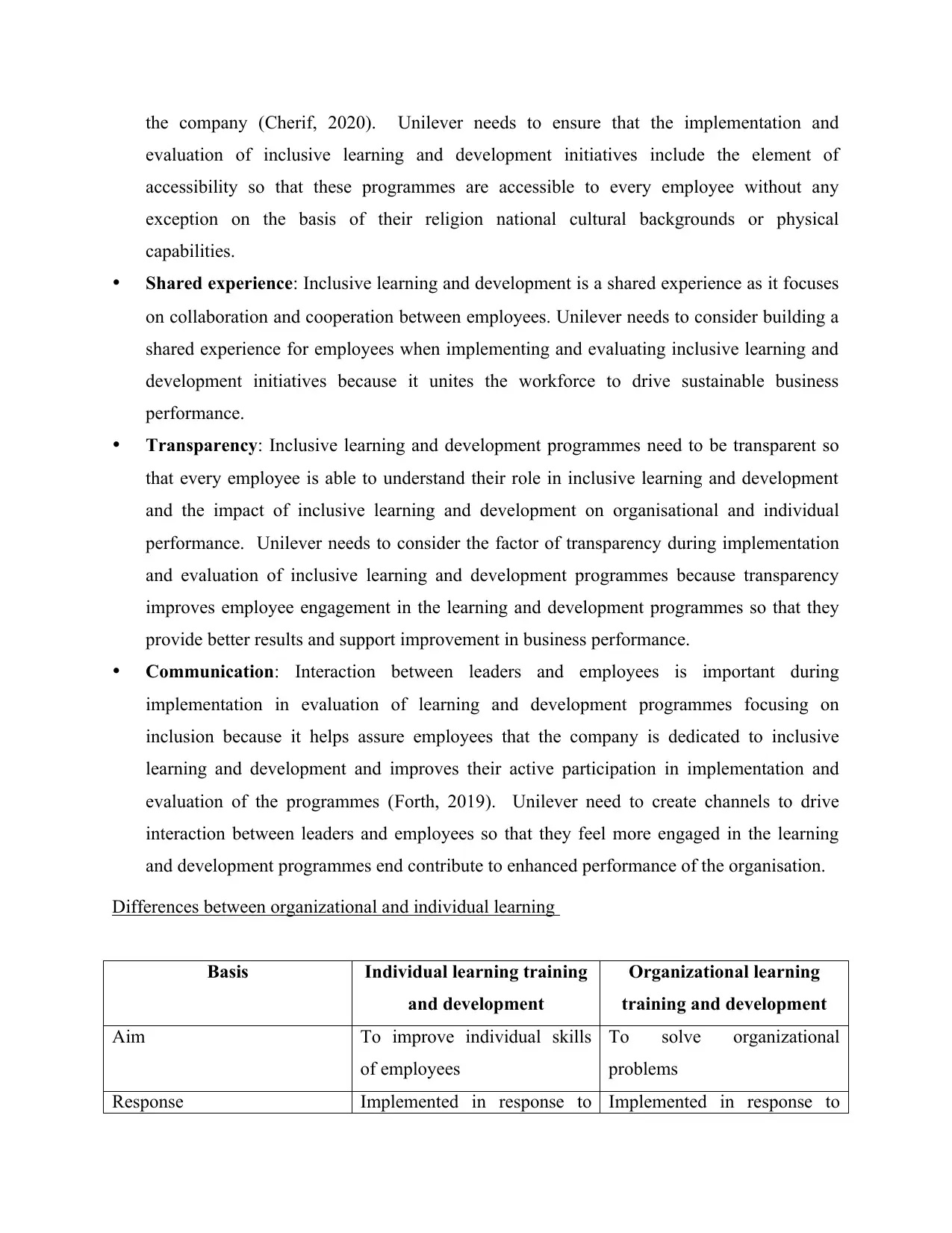
the company (Cherif, 2020). Unilever needs to ensure that the implementation and
evaluation of inclusive learning and development initiatives include the element of
accessibility so that these programmes are accessible to every employee without any
exception on the basis of their religion national cultural backgrounds or physical
capabilities.
Shared experience: Inclusive learning and development is a shared experience as it focuses
on collaboration and cooperation between employees. Unilever needs to consider building a
shared experience for employees when implementing and evaluating inclusive learning and
development initiatives because it unites the workforce to drive sustainable business
performance.
Transparency: Inclusive learning and development programmes need to be transparent so
that every employee is able to understand their role in inclusive learning and development
and the impact of inclusive learning and development on organisational and individual
performance. Unilever needs to consider the factor of transparency during implementation
and evaluation of inclusive learning and development programmes because transparency
improves employee engagement in the learning and development programmes so that they
provide better results and support improvement in business performance.
Communication: Interaction between leaders and employees is important during
implementation in evaluation of learning and development programmes focusing on
inclusion because it helps assure employees that the company is dedicated to inclusive
learning and development and improves their active participation in implementation and
evaluation of the programmes (Forth, 2019). Unilever need to create channels to drive
interaction between leaders and employees so that they feel more engaged in the learning
and development programmes end contribute to enhanced performance of the organisation.
Differences between organizational and individual learning
Basis Individual learning training
and development
Organizational learning
training and development
Aim To improve individual skills
of employees
To solve organizational
problems
Response Implemented in response to Implemented in response to
evaluation of inclusive learning and development initiatives include the element of
accessibility so that these programmes are accessible to every employee without any
exception on the basis of their religion national cultural backgrounds or physical
capabilities.
Shared experience: Inclusive learning and development is a shared experience as it focuses
on collaboration and cooperation between employees. Unilever needs to consider building a
shared experience for employees when implementing and evaluating inclusive learning and
development initiatives because it unites the workforce to drive sustainable business
performance.
Transparency: Inclusive learning and development programmes need to be transparent so
that every employee is able to understand their role in inclusive learning and development
and the impact of inclusive learning and development on organisational and individual
performance. Unilever needs to consider the factor of transparency during implementation
and evaluation of inclusive learning and development programmes because transparency
improves employee engagement in the learning and development programmes so that they
provide better results and support improvement in business performance.
Communication: Interaction between leaders and employees is important during
implementation in evaluation of learning and development programmes focusing on
inclusion because it helps assure employees that the company is dedicated to inclusive
learning and development and improves their active participation in implementation and
evaluation of the programmes (Forth, 2019). Unilever need to create channels to drive
interaction between leaders and employees so that they feel more engaged in the learning
and development programmes end contribute to enhanced performance of the organisation.
Differences between organizational and individual learning
Basis Individual learning training
and development
Organizational learning
training and development
Aim To improve individual skills
of employees
To solve organizational
problems
Response Implemented in response to Implemented in response to
Paraphrase This Document
Need a fresh take? Get an instant paraphrase of this document with our AI Paraphraser
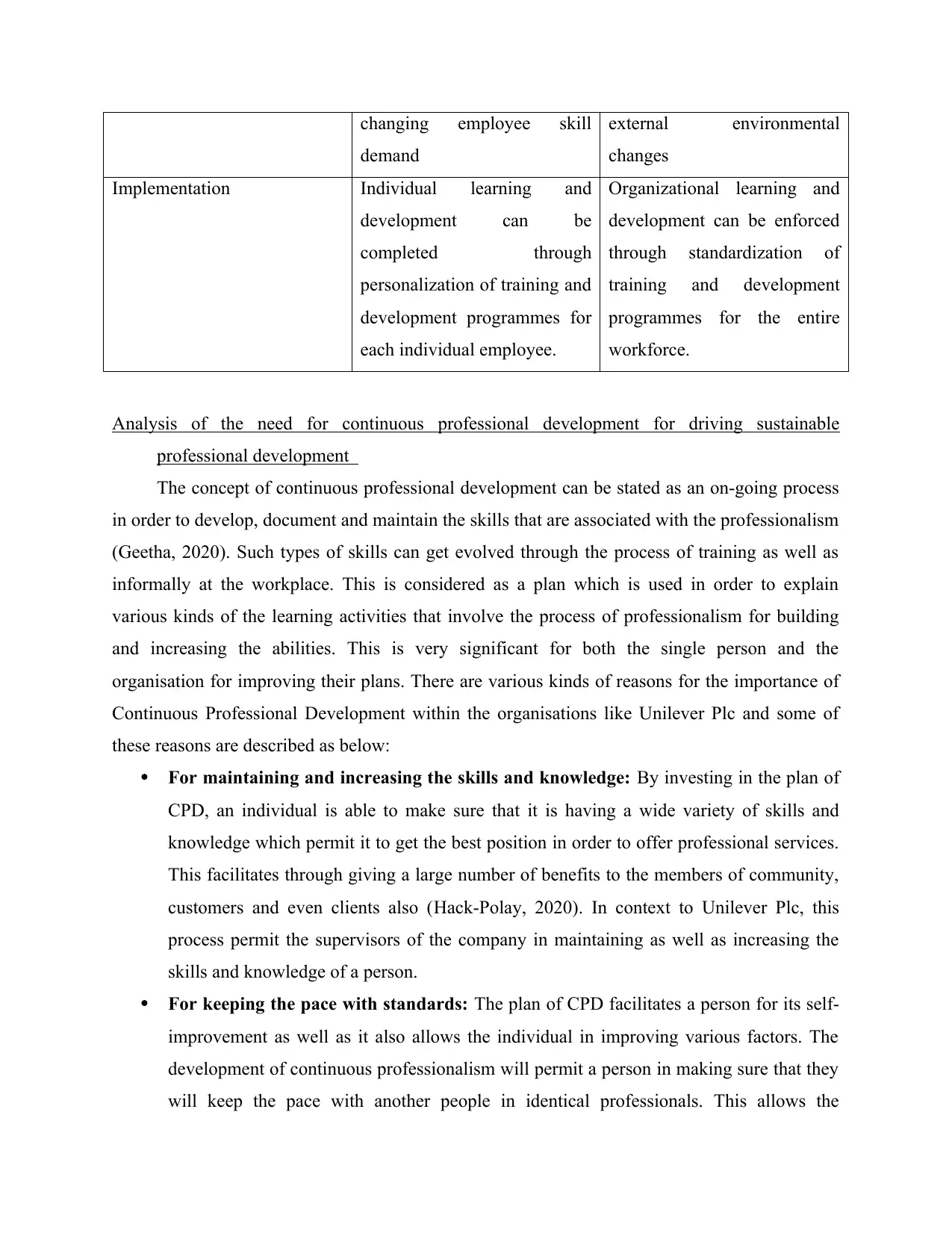
changing employee skill
demand
external environmental
changes
Implementation Individual learning and
development can be
completed through
personalization of training and
development programmes for
each individual employee.
Organizational learning and
development can be enforced
through standardization of
training and development
programmes for the entire
workforce.
Analysis of the need for continuous professional development for driving sustainable
professional development
The concept of continuous professional development can be stated as an on-going process
in order to develop, document and maintain the skills that are associated with the professionalism
(Geetha, 2020). Such types of skills can get evolved through the process of training as well as
informally at the workplace. This is considered as a plan which is used in order to explain
various kinds of the learning activities that involve the process of professionalism for building
and increasing the abilities. This is very significant for both the single person and the
organisation for improving their plans. There are various kinds of reasons for the importance of
Continuous Professional Development within the organisations like Unilever Plc and some of
these reasons are described as below:
For maintaining and increasing the skills and knowledge: By investing in the plan of
CPD, an individual is able to make sure that it is having a wide variety of skills and
knowledge which permit it to get the best position in order to offer professional services.
This facilitates through giving a large number of benefits to the members of community,
customers and even clients also (Hack-Polay, 2020). In context to Unilever Plc, this
process permit the supervisors of the company in maintaining as well as increasing the
skills and knowledge of a person.
For keeping the pace with standards: The plan of CPD facilitates a person for its self-
improvement as well as it also allows the individual in improving various factors. The
development of continuous professionalism will permit a person in making sure that they
will keep the pace with another people in identical professionals. This allows the
demand
external environmental
changes
Implementation Individual learning and
development can be
completed through
personalization of training and
development programmes for
each individual employee.
Organizational learning and
development can be enforced
through standardization of
training and development
programmes for the entire
workforce.
Analysis of the need for continuous professional development for driving sustainable
professional development
The concept of continuous professional development can be stated as an on-going process
in order to develop, document and maintain the skills that are associated with the professionalism
(Geetha, 2020). Such types of skills can get evolved through the process of training as well as
informally at the workplace. This is considered as a plan which is used in order to explain
various kinds of the learning activities that involve the process of professionalism for building
and increasing the abilities. This is very significant for both the single person and the
organisation for improving their plans. There are various kinds of reasons for the importance of
Continuous Professional Development within the organisations like Unilever Plc and some of
these reasons are described as below:
For maintaining and increasing the skills and knowledge: By investing in the plan of
CPD, an individual is able to make sure that it is having a wide variety of skills and
knowledge which permit it to get the best position in order to offer professional services.
This facilitates through giving a large number of benefits to the members of community,
customers and even clients also (Hack-Polay, 2020). In context to Unilever Plc, this
process permit the supervisors of the company in maintaining as well as increasing the
skills and knowledge of a person.
For keeping the pace with standards: The plan of CPD facilitates a person for its self-
improvement as well as it also allows the individual in improving various factors. The
development of continuous professionalism will permit a person in making sure that they
will keep the pace with another people in identical professionals. This allows the
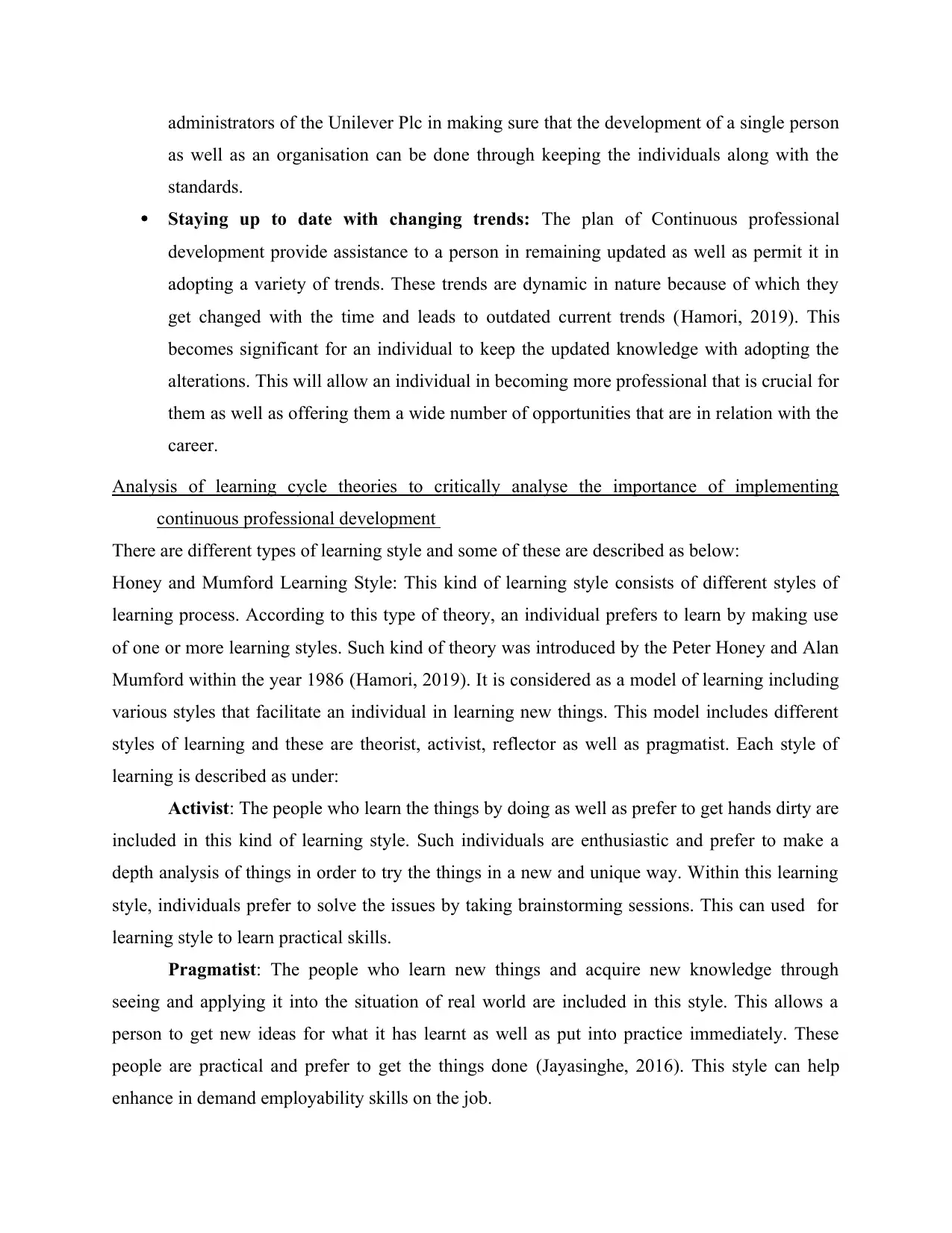
administrators of the Unilever Plc in making sure that the development of a single person
as well as an organisation can be done through keeping the individuals along with the
standards.
Staying up to date with changing trends: The plan of Continuous professional
development provide assistance to a person in remaining updated as well as permit it in
adopting a variety of trends. These trends are dynamic in nature because of which they
get changed with the time and leads to outdated current trends (Hamori, 2019). This
becomes significant for an individual to keep the updated knowledge with adopting the
alterations. This will allow an individual in becoming more professional that is crucial for
them as well as offering them a wide number of opportunities that are in relation with the
career.
Analysis of learning cycle theories to critically analyse the importance of implementing
continuous professional development
There are different types of learning style and some of these are described as below:
Honey and Mumford Learning Style: This kind of learning style consists of different styles of
learning process. According to this type of theory, an individual prefers to learn by making use
of one or more learning styles. Such kind of theory was introduced by the Peter Honey and Alan
Mumford within the year 1986 (Hamori, 2019). It is considered as a model of learning including
various styles that facilitate an individual in learning new things. This model includes different
styles of learning and these are theorist, activist, reflector as well as pragmatist. Each style of
learning is described as under:
Activist: The people who learn the things by doing as well as prefer to get hands dirty are
included in this kind of learning style. Such individuals are enthusiastic and prefer to make a
depth analysis of things in order to try the things in a new and unique way. Within this learning
style, individuals prefer to solve the issues by taking brainstorming sessions. This can used for
learning style to learn practical skills.
Pragmatist: The people who learn new things and acquire new knowledge through
seeing and applying it into the situation of real world are included in this style. This allows a
person to get new ideas for what it has learnt as well as put into practice immediately. These
people are practical and prefer to get the things done (Jayasinghe, 2016). This style can help
enhance in demand employability skills on the job.
as well as an organisation can be done through keeping the individuals along with the
standards.
Staying up to date with changing trends: The plan of Continuous professional
development provide assistance to a person in remaining updated as well as permit it in
adopting a variety of trends. These trends are dynamic in nature because of which they
get changed with the time and leads to outdated current trends (Hamori, 2019). This
becomes significant for an individual to keep the updated knowledge with adopting the
alterations. This will allow an individual in becoming more professional that is crucial for
them as well as offering them a wide number of opportunities that are in relation with the
career.
Analysis of learning cycle theories to critically analyse the importance of implementing
continuous professional development
There are different types of learning style and some of these are described as below:
Honey and Mumford Learning Style: This kind of learning style consists of different styles of
learning process. According to this type of theory, an individual prefers to learn by making use
of one or more learning styles. Such kind of theory was introduced by the Peter Honey and Alan
Mumford within the year 1986 (Hamori, 2019). It is considered as a model of learning including
various styles that facilitate an individual in learning new things. This model includes different
styles of learning and these are theorist, activist, reflector as well as pragmatist. Each style of
learning is described as under:
Activist: The people who learn the things by doing as well as prefer to get hands dirty are
included in this kind of learning style. Such individuals are enthusiastic and prefer to make a
depth analysis of things in order to try the things in a new and unique way. Within this learning
style, individuals prefer to solve the issues by taking brainstorming sessions. This can used for
learning style to learn practical skills.
Pragmatist: The people who learn new things and acquire new knowledge through
seeing and applying it into the situation of real world are included in this style. This allows a
person to get new ideas for what it has learnt as well as put into practice immediately. These
people are practical and prefer to get the things done (Jayasinghe, 2016). This style can help
enhance in demand employability skills on the job.
⊘ This is a preview!⊘
Do you want full access?
Subscribe today to unlock all pages.

Trusted by 1+ million students worldwide
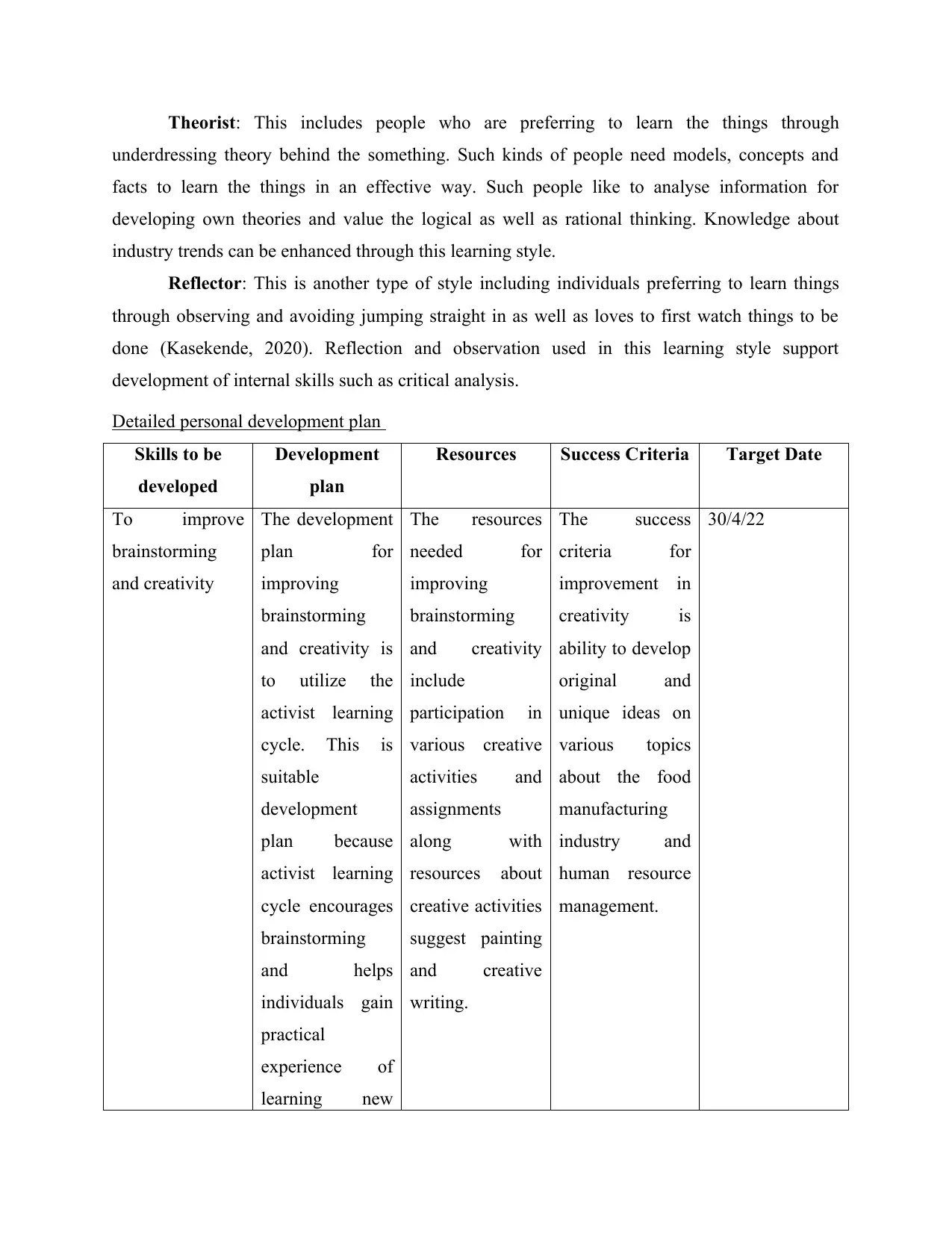
Theorist: This includes people who are preferring to learn the things through
underdressing theory behind the something. Such kinds of people need models, concepts and
facts to learn the things in an effective way. Such people like to analyse information for
developing own theories and value the logical as well as rational thinking. Knowledge about
industry trends can be enhanced through this learning style.
Reflector: This is another type of style including individuals preferring to learn things
through observing and avoiding jumping straight in as well as loves to first watch things to be
done (Kasekende, 2020). Reflection and observation used in this learning style support
development of internal skills such as critical analysis.
Detailed personal development plan
Skills to be
developed
Development
plan
Resources Success Criteria Target Date
To improve
brainstorming
and creativity
The development
plan for
improving
brainstorming
and creativity is
to utilize the
activist learning
cycle. This is
suitable
development
plan because
activist learning
cycle encourages
brainstorming
and helps
individuals gain
practical
experience of
learning new
The resources
needed for
improving
brainstorming
and creativity
include
participation in
various creative
activities and
assignments
along with
resources about
creative activities
suggest painting
and creative
writing.
The success
criteria for
improvement in
creativity is
ability to develop
original and
unique ideas on
various topics
about the food
manufacturing
industry and
human resource
management.
30/4/22
underdressing theory behind the something. Such kinds of people need models, concepts and
facts to learn the things in an effective way. Such people like to analyse information for
developing own theories and value the logical as well as rational thinking. Knowledge about
industry trends can be enhanced through this learning style.
Reflector: This is another type of style including individuals preferring to learn things
through observing and avoiding jumping straight in as well as loves to first watch things to be
done (Kasekende, 2020). Reflection and observation used in this learning style support
development of internal skills such as critical analysis.
Detailed personal development plan
Skills to be
developed
Development
plan
Resources Success Criteria Target Date
To improve
brainstorming
and creativity
The development
plan for
improving
brainstorming
and creativity is
to utilize the
activist learning
cycle. This is
suitable
development
plan because
activist learning
cycle encourages
brainstorming
and helps
individuals gain
practical
experience of
learning new
The resources
needed for
improving
brainstorming
and creativity
include
participation in
various creative
activities and
assignments
along with
resources about
creative activities
suggest painting
and creative
writing.
The success
criteria for
improvement in
creativity is
ability to develop
original and
unique ideas on
various topics
about the food
manufacturing
industry and
human resource
management.
30/4/22
Paraphrase This Document
Need a fresh take? Get an instant paraphrase of this document with our AI Paraphraser
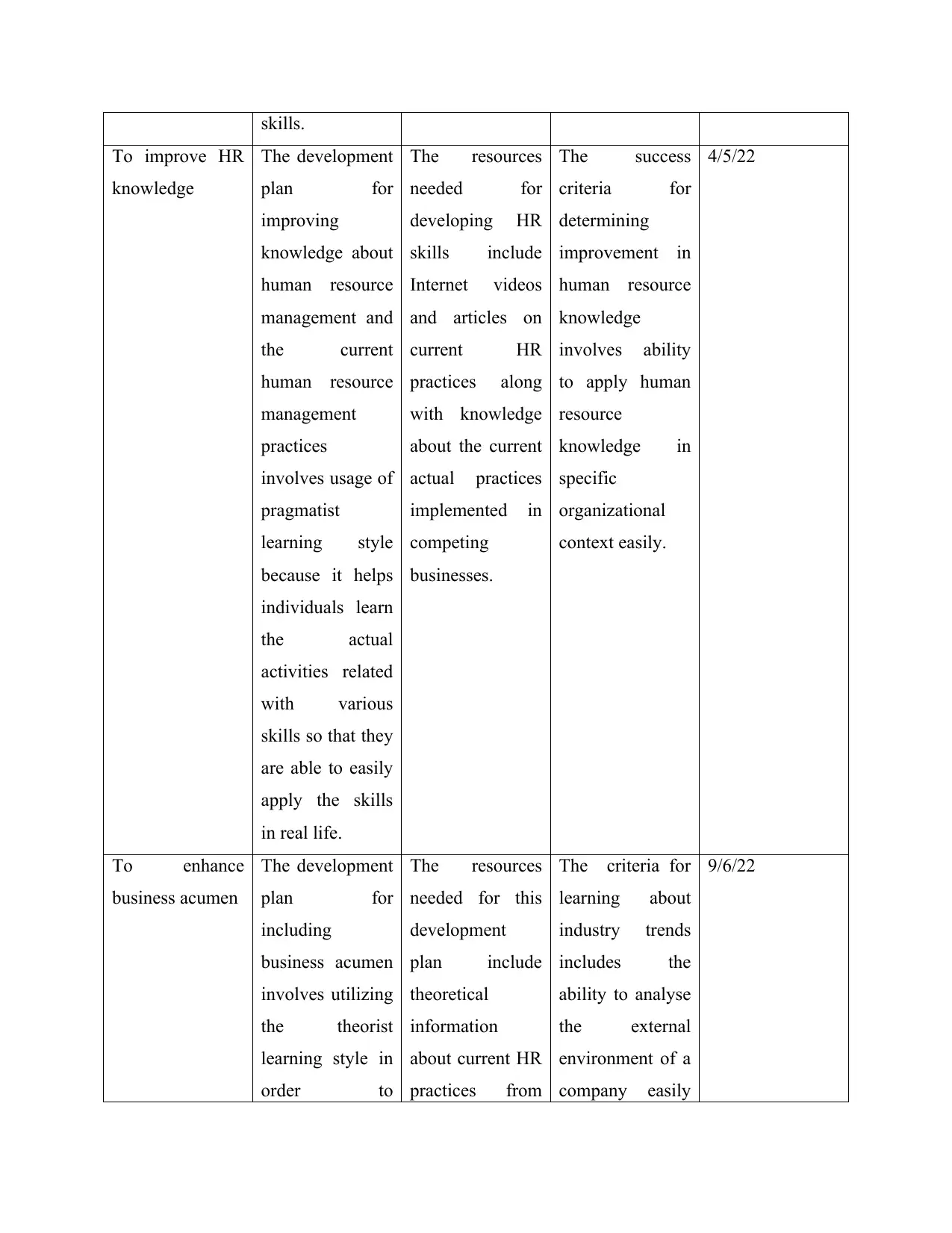
skills.
To improve HR
knowledge
The development
plan for
improving
knowledge about
human resource
management and
the current
human resource
management
practices
involves usage of
pragmatist
learning style
because it helps
individuals learn
the actual
activities related
with various
skills so that they
are able to easily
apply the skills
in real life.
The resources
needed for
developing HR
skills include
Internet videos
and articles on
current HR
practices along
with knowledge
about the current
actual practices
implemented in
competing
businesses.
The success
criteria for
determining
improvement in
human resource
knowledge
involves ability
to apply human
resource
knowledge in
specific
organizational
context easily.
4/5/22
To enhance
business acumen
The development
plan for
including
business acumen
involves utilizing
the theorist
learning style in
order to
The resources
needed for this
development
plan include
theoretical
information
about current HR
practices from
The criteria for
learning about
industry trends
includes the
ability to analyse
the external
environment of a
company easily
9/6/22
To improve HR
knowledge
The development
plan for
improving
knowledge about
human resource
management and
the current
human resource
management
practices
involves usage of
pragmatist
learning style
because it helps
individuals learn
the actual
activities related
with various
skills so that they
are able to easily
apply the skills
in real life.
The resources
needed for
developing HR
skills include
Internet videos
and articles on
current HR
practices along
with knowledge
about the current
actual practices
implemented in
competing
businesses.
The success
criteria for
determining
improvement in
human resource
knowledge
involves ability
to apply human
resource
knowledge in
specific
organizational
context easily.
4/5/22
To enhance
business acumen
The development
plan for
including
business acumen
involves utilizing
the theorist
learning style in
order to
The resources
needed for this
development
plan include
theoretical
information
about current HR
practices from
The criteria for
learning about
industry trends
includes the
ability to analyse
the external
environment of a
company easily
9/6/22
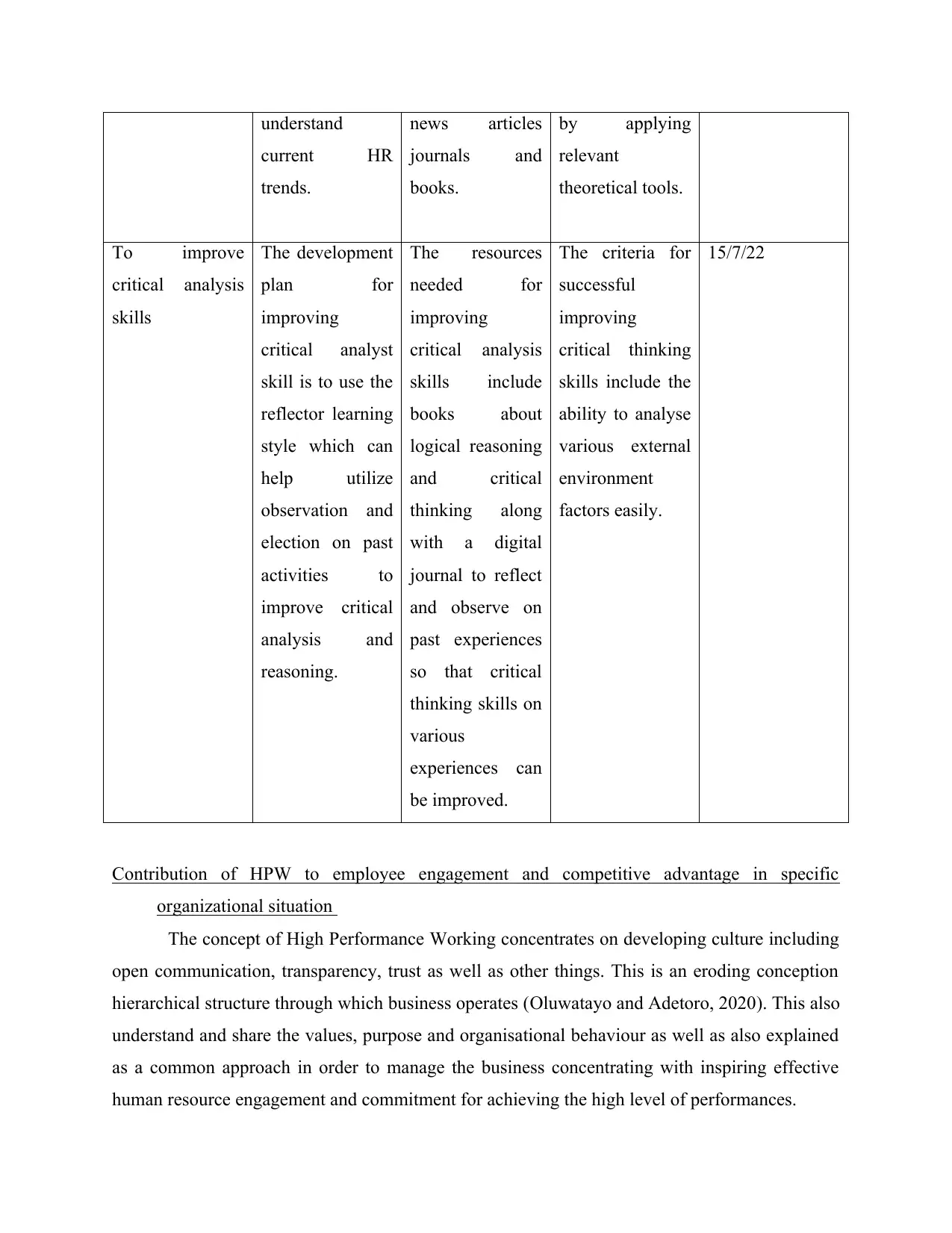
understand
current HR
trends.
news articles
journals and
books.
by applying
relevant
theoretical tools.
To improve
critical analysis
skills
The development
plan for
improving
critical analyst
skill is to use the
reflector learning
style which can
help utilize
observation and
election on past
activities to
improve critical
analysis and
reasoning.
The resources
needed for
improving
critical analysis
skills include
books about
logical reasoning
and critical
thinking along
with a digital
journal to reflect
and observe on
past experiences
so that critical
thinking skills on
various
experiences can
be improved.
The criteria for
successful
improving
critical thinking
skills include the
ability to analyse
various external
environment
factors easily.
15/7/22
Contribution of HPW to employee engagement and competitive advantage in specific
organizational situation
The concept of High Performance Working concentrates on developing culture including
open communication, transparency, trust as well as other things. This is an eroding conception
hierarchical structure through which business operates (Oluwatayo and Adetoro, 2020). This also
understand and share the values, purpose and organisational behaviour as well as also explained
as a common approach in order to manage the business concentrating with inspiring effective
human resource engagement and commitment for achieving the high level of performances.
current HR
trends.
news articles
journals and
books.
by applying
relevant
theoretical tools.
To improve
critical analysis
skills
The development
plan for
improving
critical analyst
skill is to use the
reflector learning
style which can
help utilize
observation and
election on past
activities to
improve critical
analysis and
reasoning.
The resources
needed for
improving
critical analysis
skills include
books about
logical reasoning
and critical
thinking along
with a digital
journal to reflect
and observe on
past experiences
so that critical
thinking skills on
various
experiences can
be improved.
The criteria for
successful
improving
critical thinking
skills include the
ability to analyse
various external
environment
factors easily.
15/7/22
Contribution of HPW to employee engagement and competitive advantage in specific
organizational situation
The concept of High Performance Working concentrates on developing culture including
open communication, transparency, trust as well as other things. This is an eroding conception
hierarchical structure through which business operates (Oluwatayo and Adetoro, 2020). This also
understand and share the values, purpose and organisational behaviour as well as also explained
as a common approach in order to manage the business concentrating with inspiring effective
human resource engagement and commitment for achieving the high level of performances.
⊘ This is a preview!⊘
Do you want full access?
Subscribe today to unlock all pages.

Trusted by 1+ million students worldwide
1 out of 19
Related Documents
Your All-in-One AI-Powered Toolkit for Academic Success.
+13062052269
info@desklib.com
Available 24*7 on WhatsApp / Email
![[object Object]](/_next/static/media/star-bottom.7253800d.svg)
Unlock your academic potential
Copyright © 2020–2026 A2Z Services. All Rights Reserved. Developed and managed by ZUCOL.




